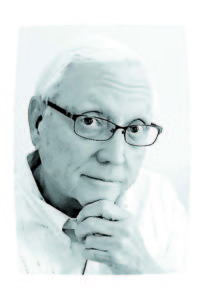
Today, boys and girls, our lesson will be about hearing aids. But wait, you say. Why should we spend time discussing something we know nothing—and, to be fair, care nothing—about?
Well, my mindless undergraduates, I was hoping you would ask.
It’s obvious you’re not aware that 15 percent or more of our U.S. population age 18 or over—in round numbers, 37-plus million—have some degree of hearing loss. Or that about 18 percent of adults ages 20 to 69 have hearing loss in both ears.
These people, I hasten to point out, are among those who say they’ve had five or more years of exposure to very loud noise at work, as compared to the 5.5 percent who report no occupational clatter at all.
So, my little angels, with that bit of enlightenment, let’s move forward. You may eventually recall the day professor Kirkland talked to you about hearing aids and, hopefully, enabled you to better understand, and deal with, the inexorable, frequently indiscernible slide into hearing malfunction.
Lesson 1: I’m not sure when my hearing began to decline. Maybe it was during my years of concert-going in the ‘60s, many times in huge, outdoor venues where enormous, 50 million-decibel (or thereabouts) speakers must have been cranked up to full ear-splitting volume.
In that same era, I’m pretty sure I could hear just fine in the newsrooms where I worked, despite the rumble of those enormous Goss printing presses that did sometimes cause me to wonder if I should bring ear plugs from home.
Nor was it anyone whistling nearby, since Buck Lanier, one of the reporters with much more seniority than me, had strictly banned the practice under threat of shoving offenders down a dark and seldom-used stairwell just steps away from our newsroom.
Summarizing, I was never much aware during those early years of anything unusual going on within the fleshy megaphones attached to both sides of my head.
The subtle realization of some degree of hearing loss crept up on me in a way similar to how I suspect cataracts sneak into one’s life. Nothing particularly dramatic, just the realization that one of those normal senses isn’t working quite the way it used to.
As to my venture along the road to hearing loss, about 18 months ago I began to wonder if some changes were taking place. I went to a meeting, and the voices of those speaking at the lectern were drowned out by people talking in the room.
At home, I got criticized for turning up the TV volume. At the office, I frequently had to ask Joyce to repeat what she had just said.
Then one day when I was taking Abby for a walk, a friend flashed her newly acquired hearing aids, tucked discreetly behind swatches of graying hair.
No price tag was visible—likely, I thought, as a result of what she told me she had paid at one of the major hearing aid providers: $7,500 minus a $2,500 contribution from her insurance company. Adjusted total: $5k. Whew!
Having had time by then to consider the diminishing quality of my own hearing, and having realized that my medical insurance doesn’t cover such expenses, I began inquiring among family and friends about their hearing aid experiences, if any.
Some, as it turned out, had been hit by similar costs; others had visited the Tempe Costco hearing center and reported good results for less than half the price of other places.
Considering my longtime love affair with Costco, where I’ve been a member for 30-some years, I dropped in one weekday to check out their services, ending with a hearing evaluation and, ultimately, a pair of tiny, behind-the-ear, fully functioning hearing aids.
As of this writing, it’s been four months (Costco provides a six-month refund guarantee if users are dissatisfied). So far, so good.
Lesson 2: Putting foreign objects in your ears definitely takes some getting used to.
There can be occasional disconcerting squeals, minor discomfort, the need for adjustments every so often and, apparently, some people who simply can’t get acclimated to a new auditory experience.
Since my initial trip, I’ve made several visits to Costco to deal with minor pain in my left ear, but that’s now gone and I’ve learned to adapt to my newly found (and newly welcome) ability to hear everything that’s going on around me, including things like the alert sounds that come when I press the lever on my car’s turn signals.
And, of course, Joyce’s proddings from her desk in our office are now loud and clear. If only I had learned these lessons years ago, the transition would have been a lot easier.

